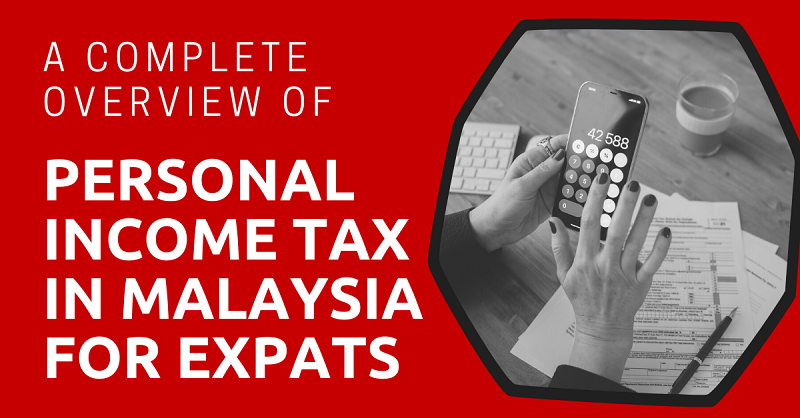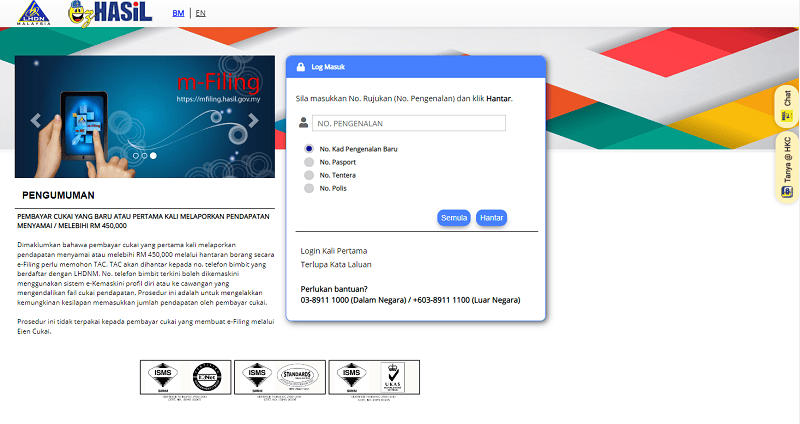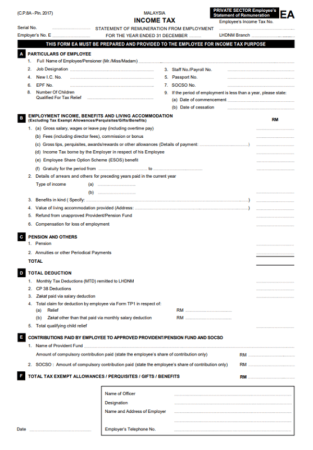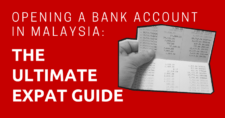
As an expat in Malaysia, you have to know the country’s income tax rules. Some people might tell you that you don’t have to pay income tax while working here, but that’s simply not true. Like most Malaysians, you will most likely have to pay and file your taxes every year.
You will also need to know the tax rates so you don’t end up underpaying or overpaying to the Inland Revenue Board (IRB) of Malaysia. There are different percentages that are payable depending on your income bracket.
If you are unsure about anything tax-related, this guide will shed some light on matters regarding income taxes for expats in Malaysia. You will find out whether you are taxable or not, what the tax rates are, and how you can file your personal income tax.
Disclaimer: This article may include links to products or services offered by ExpatDen’s partners, which give us commissions when you click on them. Although this may influence how they appear in the text, we only recommend solutions that we would use in your situation. Read more in our Advertising Disclosure.
Contents
- Do Expats Have to Pay Income Tax in Malaysia?
- Residents Vs. Non-residents Working in Malaysia
- Getting Malaysian Tax ID
- Opening and Filing Your Taxes
- When Do You Need to File Taxes?
- Getting Tax Returns
- EA Form
- Double Tax Agreement
- Are Pensions Subject to Tax?
- Do People in Malaysia Live Tax-Free?
- Now, on to You
Do Expats Have to Pay Income Tax in Malaysia?
As an expat working in Malaysia, the most common type of tax you’ll have to pay is the personal income tax. Even digital nomads or freelancers who work remotely here might have to pay income tax.
Do remember that when you are in a foreign country, you have to obey the laws there. Malaysia is not a country where you can have a lax attitude toward paying taxes. That is why if you want to continue living here legally and peacefully, make sure you pay and file your income taxes on time.
To determine if you are a taxable individual in Malaysia, you first need to find out if you are considered a resident or non-resident.
Residents Vs. Non-residents Working in Malaysia
Expats in Malaysia fall into two categories:
- Residents
- Non-residents
If you stay in Malaysia for fewer than 182 days within a calendar year, regardless of your citizenship or nationality, you are considered as a non-resident under the Malaysian tax law.
Taxable Income
Here is a quick review of the tax rates in Malaysia.
| Types of Income | Rate (%) |
| Business, trade or profession Employment Dividends Rents | 30 (With effect from year of assessment: 2016) |
| Public Entertainer Interest | 15 |
| Royalty | 10 |
| Payments for services in connection with the use of property or installation, operation of any plant, or machinery purchased from a non-resident | 10 |
| Payments for technical advice, assistance or services rendered in connection with technical management or administration of any scientific, industrial or commercial undertaking, venture, project or scheme | 10 |
| Rent or other payments for the use of any movable property | 10 |
There are exceptions too. You are not taxable if you are:
- Employed in Malaysia for fewer than 60 days
- Employed on board a Malaysian ship
- 55 years of age and receiving pension from Malaysian employment
- Receiving interest from banks
- Receiving tax-exempt dividends
Non-resident Tax
If you have a non-resident status and are working in Malaysia, your income is taxable at a flat rate of 30%. This means that the tax percentage will remain the same regardless of how much your income is. As a non-resident, you are also not eligible for any tax deductions.
If you are a foreigner who has stayed and worked in Malaysia for more than 182 days during the calendar year, you have a resident status and your income will be taxable under normal Malaysian tax laws. This also apples to local employees. Expatriates who are categorized as a resident for tax purposes will pay the progressive tax rates and are eligible for tax deductions.
Personal Income Tax Rates
Malaysia uses a progressive tax system, which means that a taxpayer’s tax rate increases as the income increases. You must pay taxes if you earn RM5,000 or USD1,250 (USD1 = RM4) and above per month.
The types of taxable income in Malaysia include:
- Employment income
- Gains or profits from a business
- Dividends, interest, or discounts
- Rent, royalties, or premiums
- Pension or annuities
- Perquisites, including bill claims, company credit cards, loans from a company, sponsored child tuition fee, or any benefits offered by the employer that can be converted into cash
Here are the personal income tax rates in Malaysia for Year of Assessment – 2021:
| Taxable income | Tax on excess (%) |
| RM5,000 (USD1,250) | 1 |
| RM20,000 (USD5,000) | 3 |
| RM35,000 (USD8,750) | 8 |
| RM50,000 (USD12,500) | 13 |
| RM70,000 (USD17,500) | 21 |
| RM100,000 (USD25,000) | 24 |
| RM250,000 (USD62,500) | 24.5 |
| RM400,000 (USD100,000) | 25 |
| RM600,000 (USD150,000) | 26 |
| RM1 million (USD250,000) | 28 |
| Exceeding RM2 million (USD400,000) | 30 |
Withholding Tax
According to the IRB, withholding tax is an amount withheld by the party making a payment (payer) on income earned by both tax resident and non-resident, and paid to the Malaysian IRB.
For example, if you are working in Malaysia, your employer will withhold personal income taxes from your salary and pay them to the IRB on your behalf every month.
All withholding tax payments are required to be made with the relevant payment forms, duly completed, together with a copy of invoices issued by the non-resident payee and a copy of payment documents as proof of date of payment.
The ‘payer’ refers to an individual or entity carrying on a business in Malaysia and is required to withhold tax on payments for services rendered, technical advice, rental, or other payments made under any agreement for the use of any moveable property and paid to the non-resident payee.
The ‘payee’ refers to a non-resident individual or entity in Malaysia who receives the payments previously mentioned.
According to the Income Tax Act 1967, a payer is liable to make payments to a non-resident person (payee), and the payer must withhold tax at the following rates:
| Payment type | Withholding tax rates |
| Contract payment | 3%, 10% |
| Interest | 15% |
| Royalties | 10% |
| Technical fees, payment for services, rent/payment for the use of moveable property | 10% |
| Interest paid by approved financial institutions | 5% |
| Income of non-resident public entertainers | 15% |
| Real Estate Investment Trust (REIT) – Other than a resident company – Non-resident company – Foreign investment institution | 10%, 24%, 10% |
Tax Relief and Deductions
It is not all doom and gloom when it comes to paying your income taxes. If you qualify as a tax resident, you are eligible for several tax deductions and benefits that are offered by the Malaysian government. These will include:
- Tax relief for a spouse (as long as the spouse does not earn an income within or outside of Malaysia)
- Tax relief for taxpayers who have to pay parental care
- Tax relief for each child below the age of 18
- Tax relief for children studying at the tertiary level (university or college)
In brief, here is a table that shows the tax reliefs that can be deducted for a tax resident:
| Reliefs | Amount |
| Self | RM9,000 (USD2,250) |
| Spouse (under joint assessment) | RM4,000 (USD1,000) |
| Child under the age of 18 | RM2,000 (USD500) |
| Child over the age of 18 who is receiving full-time instruction at an establishment of higher education inside or outside Malaysia | RM8,000 (USD2,000) |
| Medical treatment, special needs and carer expenses for parents (Medical condition certified by medical practitioner) | RM8,000 (USD2,000) |
| Disabled: Self | RM6,000 (USD1,500) |
| Spouse | RM5,000 (USD1,250) |
| Child: Each physically or mentally handicapped child | RM6,000 (USD1,500) |
| Additional relief if a child is over 18 and receiving higher education | RM8,000 (USD2,000) |
Getting Malaysian Tax ID
To legally be a tax resident in Malaysia and pay the individual income tax, you need to get a Malaysian tax ID from the IRB office near you. If you are working for a company in Malaysia, rest assured that your employer will assist in applying for a tax ID at the nearest IRB for you.
To legally work and earn an income from a company in Malaysia, we cannot stress enough that you must have a legal and valid work permit, as immigration officers are pretty strict in checking foreigners’ passports and documents. Check out our guide on how to get a proper work permit in Malaysia if you are looking to work here.
Opening and Filing Your Taxes
To start filing your income tax as an expat, you will need a tax number from the IRB. Normally, employers that hire expats will obtain the income tax numbers for their foreign workers. However, if the company fails to obtain one, you can register for an income tax number at the nearest IRB office on your own. Make sure to get all the relevant documents from your company as required by the IRB.
The IRB office will give you a first-time login PIN so you can file your income tax return on their official website.
Once you have your PIN, you may log in to the IRB website. If you are a first-time user, you will be asked to create a password for your new account.

You can then start filing your income taxes.
You will find the relevant information you need from the EA form, which has several parts. The human resources department of the company provides this form annually.
In the first part of the form, you will have to review your personal details like your name and passport number. Be sure to change these accordingly if you have recently updated your passport or if your marriage status has changed.
Next, you have to fill in your income information. The most important field would be the ‘Statuary income from employment’ which asks you to indicate how much you are earning from your job. You will also have to provide the company ID number for this, which can be found in the EA form.
You can also declare any monetary donations or gifts that you have received.
There’s also a tax relief and deductions section where you can declare your purchases and other expenses from the previous year, which will provide tax relief. Once everything is filled in, you will know how much taxes you have to pay or how much tax return you’re going to get. Remember that your employer paid the taxes on your behalf, which they do by deducting the amount of taxes from your monthly wages. Check that the amount is correct.
Finally, you will need to declare that all the information you have provided are true. Be sure to save the e-filing documents for your own reference.
If you have any doubts, there are special computers at IRB branches all over Malaysia, and you can get help with filing from the tax officers at the IRB offices that we have mentioned earlier.
Generally, people are encouraged to use the online tax filing system if they have internet access. However, you could also head to the nearest IRB office where there are computers that can be used for this purpose and officers to guide you. Note: As an expat who is a tax resident working for a company, you will be filing using the BE (e-BE) form.
When Do You Need to File Taxes?
In Malaysia, the tax year corresponds to the calendar year: beginning on January 1 and ending on December 31. All tax returns must be completed and returned before April 30 of the following year.
Take note that if you file an incorrect tax return as an expat either by omitting or understating your income, the IRB will charge 100% of the underpaid taxes as a fine. Filing your taxes late may result in late fees of up to 10% of the taxes payable.
You can pay your taxes by credit card or via online bank transfer in case you were found to have underpaid. Companies are usually diligent at deducting the taxes from your wages, so this is not something you will often have to worry about.
Getting Tax Returns
If you get a tax return, the IRB will directly transfer it to the bank account number you have provided to them. It can take anywhere from under a week to a few months to get your tax returns.
EA Form
The EA form is a Yearly Remuneration Statement for private employees, which includes your salary for the past year. This form is used for filing personal taxes during tax season.
Taxpayers need EA forms to ensure that they’re declaring the right amount of earnings and exemptions in the tax filing. The EA Form can also be used to check if a taxpayer is above the pay grade required to pay taxes.

Employers are required to prepare and distribute the EA Form before the last day of February every year. Companies that fail to prepare and give EA Forms to employees before the last day of February will either incur a fine of RM200 to RM 20,000 or face imprisonment for a term not exceeding 6 months, or both.
Double Tax Agreement
Over 50 countries have double taxation agreements with Malaysia to ensure that no one gets taxed twice — once by Malaysia and again by the taxpayer’s country of origin. The United States, Canada, the United Kingdom, Australia, New Zealand, Germany, Norway, and Russia are some of the countries that have such treaties in place.
You can see the full list here. Note that even if Malaysia has a double taxation agreement with your country, you might still have to file personal income taxes in your home country.
Are Pensions Subject to Tax?
Income taxes will be imposed on resident individuals in Malaysia on income derived from foreign sources and received in Malaysia, with effect from 1 January 2022. However, if the income is received abroad, it is tax-exempted. But this may change. This is why you must stay up-to-date with the latest news on changes in policies.
If you have been working here for a very long time, you’ll need to understand how pensions work. Pensions are derived from being employed in Malaysia where the recipient has reached the age of 55, or the compulsory retirement age, or retires due to ill health. These are exempt from tax.
Retirement gratuities are also fully exempt from tax when they meet the following criteria:
- Where the retirement is due to ill health
- On or after reaching the age of 55 or other compulsory age of retirement*
- Upon reaching compulsory retirement age pursuant to an employment contract or collective agreement at the age of 50 but before 55*
*Employment has lasted 10 years with the same employer or with companies in the same group.
Do People in Malaysia Live Tax-Free?
Everyone living in Malaysia has to pay taxes. Taxes are are paid either directly or indirectly.
An example of a tax paid directly is the Sales and Service Tax (SST), which comprises two elements. The first element is the sales tax (5%–10%), which is imposed on products manufactured and produced locally and on taxable goods imported into Malaysia. The second element is the service tax, which is the consumption tax (6%) imposed on taxable services provided in Malaysia by a registered service provider carrying out a business. If you buy a home and a vehicle, you will also have to pay taxes annually for both.
Now, on to You
Moving to a new country and adjusting to a new life all while navigating the complexities of employment rules and figuring out taxes can be pretty challenging. But with the right guidance and advice, your life will be much easier.
So make sure you organize and categorize your different sources of income, and then check what your liabilities are and what the tax rates for each source is. Also, don’t forget to properly file all your expenses and receipts for easy reference — the IRB may ask to see proof of your financial status and expenditure while you are living here.
Lastly, don’t hesitate to consult an accountant or get help from the IRB office when you are paying and filing your income tax. Make sure you ask them any questions to clear your doubts. Ensure that all your taxes are properly paid and filed, so you can have peace of mind knowing that the tax man won’t be coming after you.






